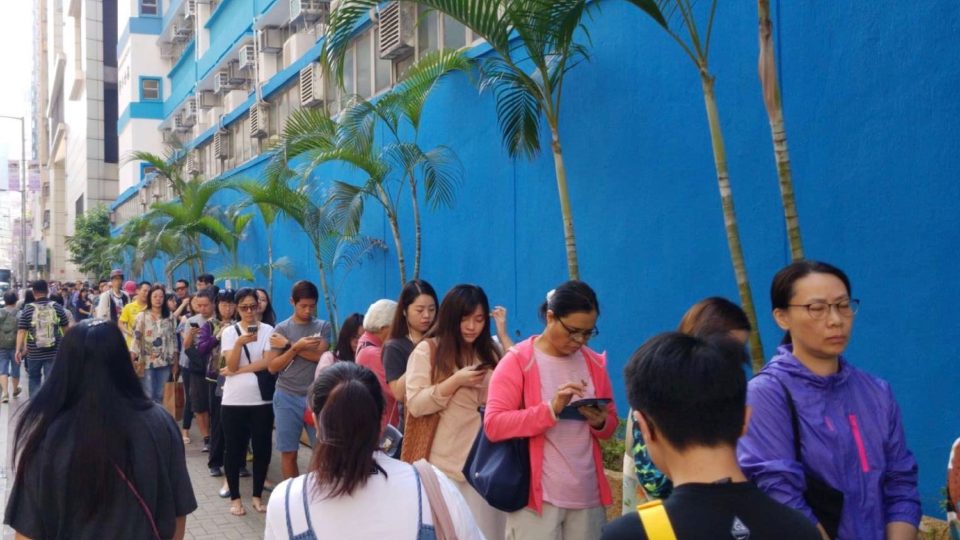Voting kicked off in Hong Kong’s district council elections today, with candidates campaigning on the kinds of hyper-local issues that might appear indecipherable to those outside of the neighborhoods involved.
Fixing traffic issues behind a housing block, opposing the “illegal” conversion of a garage into a shop, and, in one case, “striving for improvements in the railing design” — whatever that means — were all among the promises made by the city’s would-be councillors.
But overshadowing the mundane local matters is one particularly large, black-clad elephant in the room: the city’s months-long pro-democracy protest movement.
As one campaign volunteer put it: “It’s all about the five demands.”
Hong Kong’s district council elections are arguably the closest thing the city has to direct democracy. The Legislative Council, while directly elected in part, is also stacked with so-called “functional constituencies” that represent industries and interest groups that often lean towards Beijing. The city’s chief executive is chosen by a small group of electors, also predominantly pro-establishment.
The district councils, by comparison, exercise little power in theory beyond their small jurisdictions. But that hasn’t stopped voters from lining up in droves to cast a ballot in what is seen by many as a referendum on the city government’s deeply unpopular — and increasingly heavy-handed — response to the ongoing protests.
Lines were similarly long and peaceful in the #HongKong neighborhood of Tai Kok Tsui. #DistrictCouncilElection pic.twitter.com/TIIUD0YySm
— Coconuts Hong Kong (@CoconutsHK) November 24, 2019
Andrew Tung, 35, cast his ballot in a local election for the first time today, saying he’d been motivated less by concerns in his neighborhood of North Point than by the broader situation in the city.
“I voted for the underdog,” he told Coconuts HK this morning, referring to pro-democrats. “I think the government has been quite irresponsible with what is happening in Hong Kong. The candidate here has been here a long time… so hopefully we can bring some change to the area.”
Pro-democracy protesters are demanding, among other things, universal suffrage in choosing the city’s leader, and a landslide pro-dem win today would result in more pro-dem voices — as many as 117 — in the group of electors that select the chief executive.
One voter in the Central and Western district, surnamed Lo, also told Coconuts that he was motivated by the possibility of effecting change in the process of electing the chief executive.
“I am voting today because I want to send out a strong message to the government that I and many Hongkongers support the pro-democracy camp and are unhappy with the way they’ve handled these protests in the past six months,” he said. “
Although the powers of the district councillors may be limited, they can communicate our voice to the government. If we secure a large number of seats for the pro democracy camp, they they can also have some say in the selection of the next chief executive, or even nominate a pro-democracy candidate. This would be hugely important for us.”
Pro-dem Civic Party candidate Tat Cheung, meanwhile, said that, in addition to pushing for to improve traffic and parking in North Point, he would also be demanding answers from police regarding the apparent lack of action taken against pro-Beijing mobs that attacked protesters in the neighborhood in recent months — an issue that has animated many in the pro-dem camp.
Civic Party candidate Tat Cheng, doing some last minute canvassing this morning, said that based on turnout so far, pro-dems’ efforts to link local issues to the broader situation in #HongKong has been ‘a very successful strategy.’ #DistrictCouncilElections pic.twitter.com/9Hpyt1Cpm8
— Coconuts Hong Kong (@CoconutsHK) November 24, 2019
“[We’re] saying some issues we talk about in district meetings will affect the political situation in Hong Kong,” he said in an interview as he did some last-minute campaigning outside a busy shopping center.
Linking local issues to the broader situation, he said, appears to have worked.
“In view of the turnout rates so far, I think this is a very successful strategy,” he said.
Indeed, lines were long all over North Point — as they were across the city — with the queue for one polling station stretching from the entrance, around one corner of the block, then another, then another, before snaking into a zig-zagging cordon, which also failed to entirely contain it.
Whether the same motivation invigorating pro-dem turnout was also at work on the pro-establishment side was unclear. A group of volunteers holding signs touting Gary Cheng — a candidate for the DAB, the city’s largest pro-Beijing party — declined to be interviewed.
According to the government, as of 10:30am, more than 720,000 voters had already turned out — some 17 percent of the electorate, or triple the rate seen during the same period in 2015’s poll. Total turnout in 2015, by way of comparison, was 47 percent.
A record 4.13 million citizens have registered to vote this year.
The large, and early, turnout was no mistake, according to volunteer Dr. Peggy Li, who was out campaigning on behalf of the Civic Party last night.
“The phenomenon is that, the higher the voting rate, the more people will be voting for the pro-democracy people, so I think we have a good chance of winning, even as an underdog,” she said, adding that there were fears authorities may find reasons to close polls before the appointed time of 10:30pm. “That’s why we’ve been asking people to come out for voting tomorrow as early as possible.”
In spite of the increasingly violent protests that have characterized the past few months in Hong Kong, today’s polls were off to an orderly start, with some riot police seen keeping an eye on the voting.
“Facing the extremely challenging situation, I am pleased to say… we have a relatively calm and peaceful environment for (the) election today,” Chief Executive Carrie Lam said after voting in her constituency on Hong Kong island.
Additional reporting by AFP.




